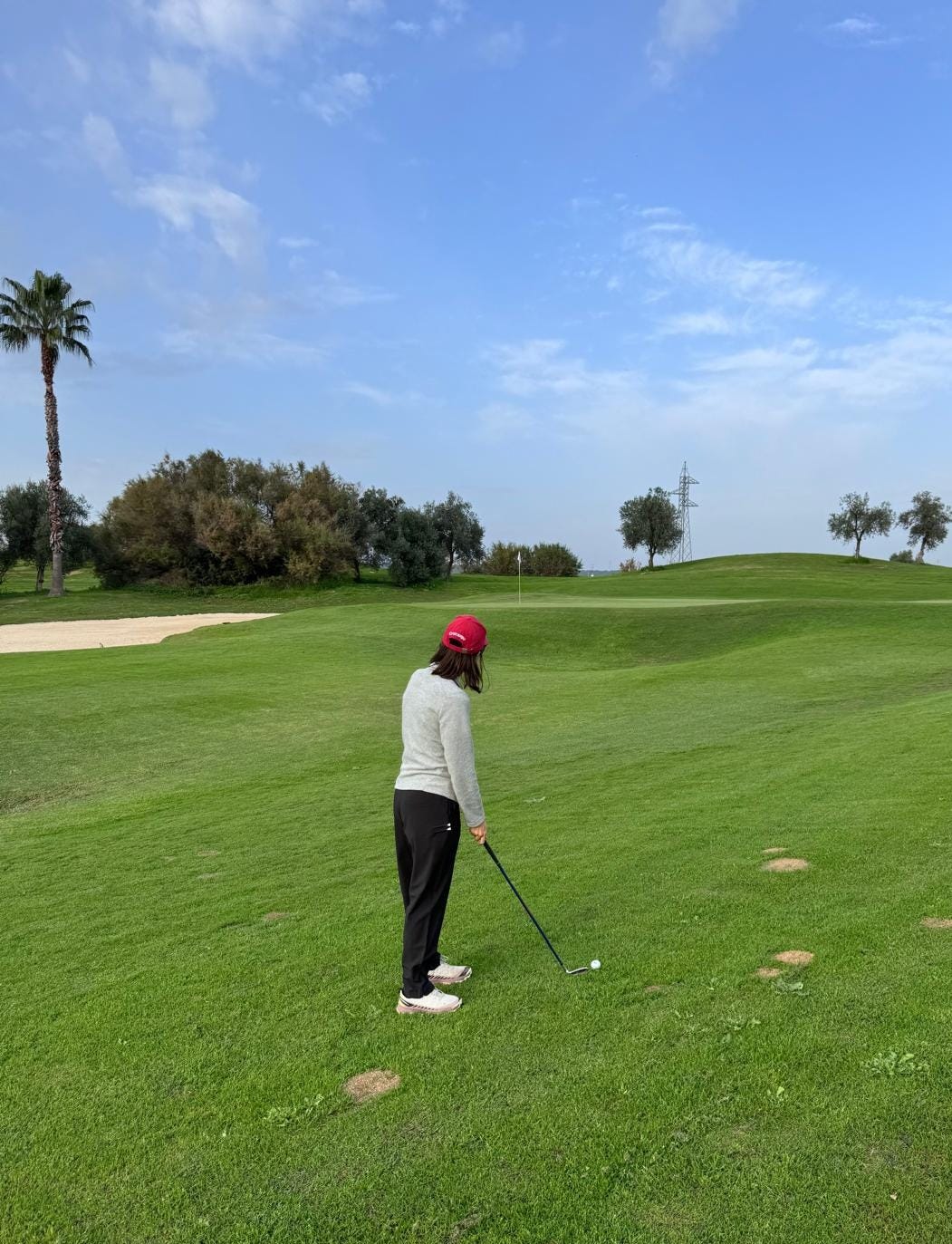My husband and I have been enrolled in golf lessons since October. Learning to hit a tiny ball with a long stick is brutal, especially as an adult with no experience. I often think of these lessons as a way to build frustration tolerance and develop grit.

The process has a lot in common with language learning. There are good days and bad, there's always more to learn, consistent effort is key, and a good teacher can make all the difference.
Back in February, I published a mini-series on language classes:
I had always planned to finish the series with this post, but other ideas pulled me in different directions.
Now feels like the right time to come back to it. This Tuesday, 1 April, a new episode of the Love to Lingo podcast comes out. I talk with the fantastic Michelle from WeCultivate about some of the common traps language learners fall into when choosing a teacher, coach, or program.
If you’re thinking about working with a teacher, this post builds on that conversation and offers a few things to consider as you try to find the right person for you.
The Search Phase
Looking for a language teacher can feel overwhelming at first. There are so many options, with different backgrounds, teaching styles, and formats to choose from. But a little clarity about what to look for can go a long way.
Qualifications, Training, and Experience
A great teacher doesn’t just speak the language well. They know how to teach it. Look for someone with training or a recognised teaching qualification. This usually means they’ve learned how to explain grammar and vocabulary clearly, structure lessons effectively, and support different types of learners. It also shows they’ve put time and thought into the craft of teaching, not just the content.
If you're working toward a specific goal, such as passing an exam or using the language in a particular context, try to find a teacher who has helped others in similar situations. For general language improvement, experience still matters, though newer teachers may bring energy, creativity, and a flexible approach.
You’ll also find many self-taught polyglots/autodidacts offering courses, coaching, or programs. Some of these are legitimate, but be cautious of anything that promises fast or effortless results. Language learning takes time, consistency, and effort—no matter who your teacher is.
Native or Non-Native?
There’s a common assumption that native speakers are always better teachers. But in reality, both native and non-native teachers bring valuable strengths, and the best fit depends on what you're looking for.
Non-native teachers often have first-hand experience learning the language themselves. They understand the challenges and can offer strategies to avoid common mistakes or think about particular grammar or vocabulary. If you share a language or cultural background, they might also be able to explain things in a way that makes more sense to you. If you're unsure about their level, check that they list both a language certificate and a teaching qualification.
Native speakers may provide more natural exposure to pronunciation, idiomatic language, and cultural references. They might be a great fit if you're planning on using the language with other native speakers or want to understand how the language is used in everyday life.
In the end, there's no single right choice. The most important thing is finding someone whose background, approach, and personality work well for you.
The Consultation Phase
Now that you’ve found someone or an organization you’re interested in working with, it’s time for the consultation or level test. This meeting might be with the teacher themselves or with a manager or coordinator.
By the end of the consultation, you should have a clearer sense of:
What you’re working towards
How you’ll work towards that objective
What’s expected of the teacher and student(s)
What classes will be like
Preparation
It’s worth preparing a little beforehand. Start by defining your goals, intentions, and timelines. (You can use this goal-setting guide if you need help.)
Be honest with yourself about what kind of support you’re looking for. For example:
Do you want someone who makes you feel comfortable and helps build your confidence?
Do you want someone who challenges you, corrects every mistake, and pushes you to improve, even if it feels a bit uncomfortable?
Do you prefer a structured, methodical approach, or would you rather the lesson be more flexible and responsive to your needs that day?
What to expect
Once you’re clear on what you need, you’ll be in a much better position to make the most of the consultation. Here's a typical format for these types of meetings:
Introductions and getting to know each other (in your first or target language)
A discussion about your goals, background, and deadlines
A short conversation in your target language to get a sense of your level
Feedback on your strengths and weaknesses (and possibly a level estimate)
A conversation about pricing, timetables, and expectations
Agreement on the next steps
Don’t hesitate to ask questions. The more information you have, the easier it will be to decide whether the course or teacher is right for you. Some useful topics to ask about include:
overall focus of course
format of a lesson
feedback and correction
homework
how progress is measured
policies on cancellations or rescheduling
Your responsibility
A skilled teacher can support and guide you, but it’s still YOUR journey. Staying involved in the decision-making process helps you stay motivated and aware of what’s working. Trust your teacher’s expertise, but keep checking in with yourself too.
What would you add to this list? I’d love to hear what’s helped you choose a great teacher, or what you wish you’d known earlier.
If this topic interests you, subscribe to the Love to Lingo Podcast on Spotify or Apple Podcasts. In the next episode (coming out 1 April), I talk with Michelle from We.Cultivate about avoiding some common mistakes when looking for a language trainer.
Thanks as always for reading Love to Lingo. If you’ve found this post helpful, please consider subscribing, re-stacking or sharing with other language learners or language teachers! Happy Language Learning 🤍.







A great read and extremely useful guidance for any language learner looking for someone to help them on their language learning journey!
From the perspective of a teacher, there are many students I just hit it off with, there's that instant rapport and you know we're going to click. I bring my natural personality which includes my quirky humour and some students appreciate that, others less so.
There are also, however, some students where I think we want to strangle each other in the first few lessons but then things settle down and they turn out to be some of my favourite students.
Obviously there's a massive difference between a class and 1-1. I find it funny that some of the students I really didn't enjoy teaching at all are the ones who later on ask me for private lessons! It's like, 'we hated each other and now you want me to teach you?' 😂
I've only recently joined Spotify and have just added your podcast to my list :)